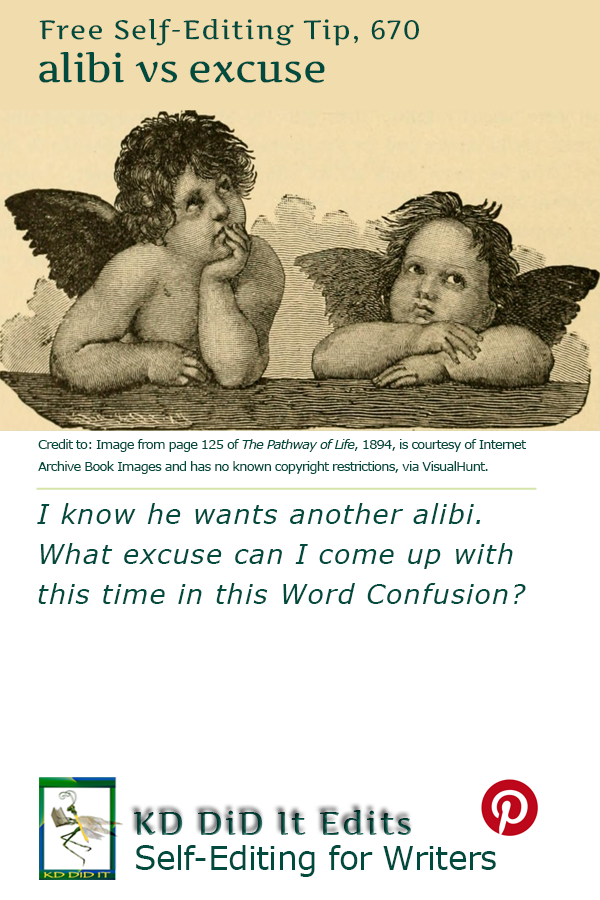Revised as of 11 April 2021
I got to wondering about the difference between alibi and excuse. There had to be one, but what as the pivotal difference?
It turns out that I’ve using excuses for years. Haven’t needed an alibi…yet.
An alibi involves being elsewhere to prove any innocence and is primarily (technically) a legal usage. Naturally, this being English, using alibi (in the noun sense) to mean excuse began to be used informally in the U.S. in the twentieth century. It’s considered acceptable in standard English. As a verb, only use alibi informally.
An excuse is a defense, a request to forgive or let off the hook, to justify one’s behavior on the “guilty” party’s part while the person being offered the excuse would forgive, absolve, exempt, or overlook the person excusing themselves.
Word Confusions…
…started as my way of dealing with a professional frustration with properly spelled words that were out of context in manuscripts I was editing as well as books I was reviewing. It evolved into a sharing of information with y’all. I’m hoping you’ll share with us words that have been a bête noir for you from either end.
If you found this post on “Alibi versus Excuse” interesting, consider tweeting it to your friends. Subscribe to KD Did It, if you’d like to track this post for future updates.
| Alibi | Excuse |
|---|---|
| Credit to: Apple Dictionary.com; Dictionary.com: alibi and excuse | |

Goran Jelisić Committing Murder is a photograph provided courtesy of the International Criminal Tribunal for the former Yugoslavia (ICTY), via Wikimedia Commons. — When he’s caught in the act, there ain’t no alibi gonna help him. |

“I can’t get up, I’ve got the cat on my lap”, circa 1910, by pellethepoet is under the CC BY 2.0 license, via Flickr. — That’s as good an excuse as any… |
| Part of Grammar: | |
| Noun 1; Verb, intransitive & transitive
Plural for the noun and third person present verb: alibis |
Noun; Verb, transitive
Plural for the noun and third person present verb: excuses |
| Noun: [Law] A claim or piece of evidence that one was elsewhere when an act, typically a criminal one, is alleged to have taken place
A person used as one’s excuse Verb, intransitive: Offer a defense Verb, transitive: To make or find (one’s way) by using alibis |
Noun: A reason or explanation put forward to defend or justify a fault or offense
[Informal; an excuse for] A poor or inadequate example of Verb, transitive:
Release (someone) from a duty or requirement
To offer an apology for
To serve as an apology or justification for
To refrain from exacting
|
| Examples: | |
| Noun: She has an alibi for the whole of yesterday evening. His whole defense hinges on his alibi. It’s a catch-all alibi for failure and inadequacy. My sick grandmother was my alibi for missing school. Verb, intransitive: Do I need to alibi for being late? He’s alibied up the ying-yang. Verb, transitive: He alibied his friend out of a fix. Yeah, well I’m starting to wonder about the man who alibied the guy. She alibied her guy with some provable facts. |
Noun: There can be no possible excuse for any further delay. No one will have the excuse that they didn’t know. When the rain started, he used it as an excuse to leave early. Chris is a pathetic excuse for a man! Oh, honey, just make our excuses. Ignorance of the law is no excuse. Verb, transitive: Pardon me. Excuse me. Would you let me through? He did nothing to hide or excuse Jacob’s cruelty. You must excuse my sister. Well, excuse my French… He could be excused for feeling that he was born at the wrong time. Please, sit down — excuse the mess. His ability excuses most of his faults. It will not be possible to excuse you from jury duty. Now, if you’ll excuse us, we have to be getting along. Please excuse us, we’re running late. He excused his absence by saying that he was ill. Please, may I be excused? She is usually excused from her duties during the school holidays. She was excused duties on Saturday. He said he would excuse your debt, so what else is on your mind? |
| Derivatives: | |
| Adjective: excusable, excusatory, excuseless, excusive, nonexcusable, self-excused, self-excusing, unexcusable, unexcusing Adverb: excusably, excusingly, excusively, nonexcusably, unexcusably Noun: excusableness, excusal, excuser, nonexcusableness, self-excuse |
|
| History of the Word: | |
| Late 17th century, as an adverb in the sense of elsewhere, from the Latin, meaning elsewhere. | Middle English, from the Old French escuser (verb), from the Latin excusare meaning to free from blame, which is from ex- (out) + causa (accusation, cause). |
C’mon, get it out of your system, bitch, whine, moan…which words are your pet peeves? Also, please note that I try to be as accurate as I can, but mistakes happen or I miss something. Email me if you find errors, so I can fix them…and we’ll all benefit!
Pinterest Photo Credits:
Image from page 125 of The Pathway of Life, <https://visualhunt.com/f2/photo/14596262938/72edc41ae0/>, 1894, is courtesy of Internet Archive Book Images and has no known copyright restrictions, via VisualHunt. It has been resized and the background extended upwards.


